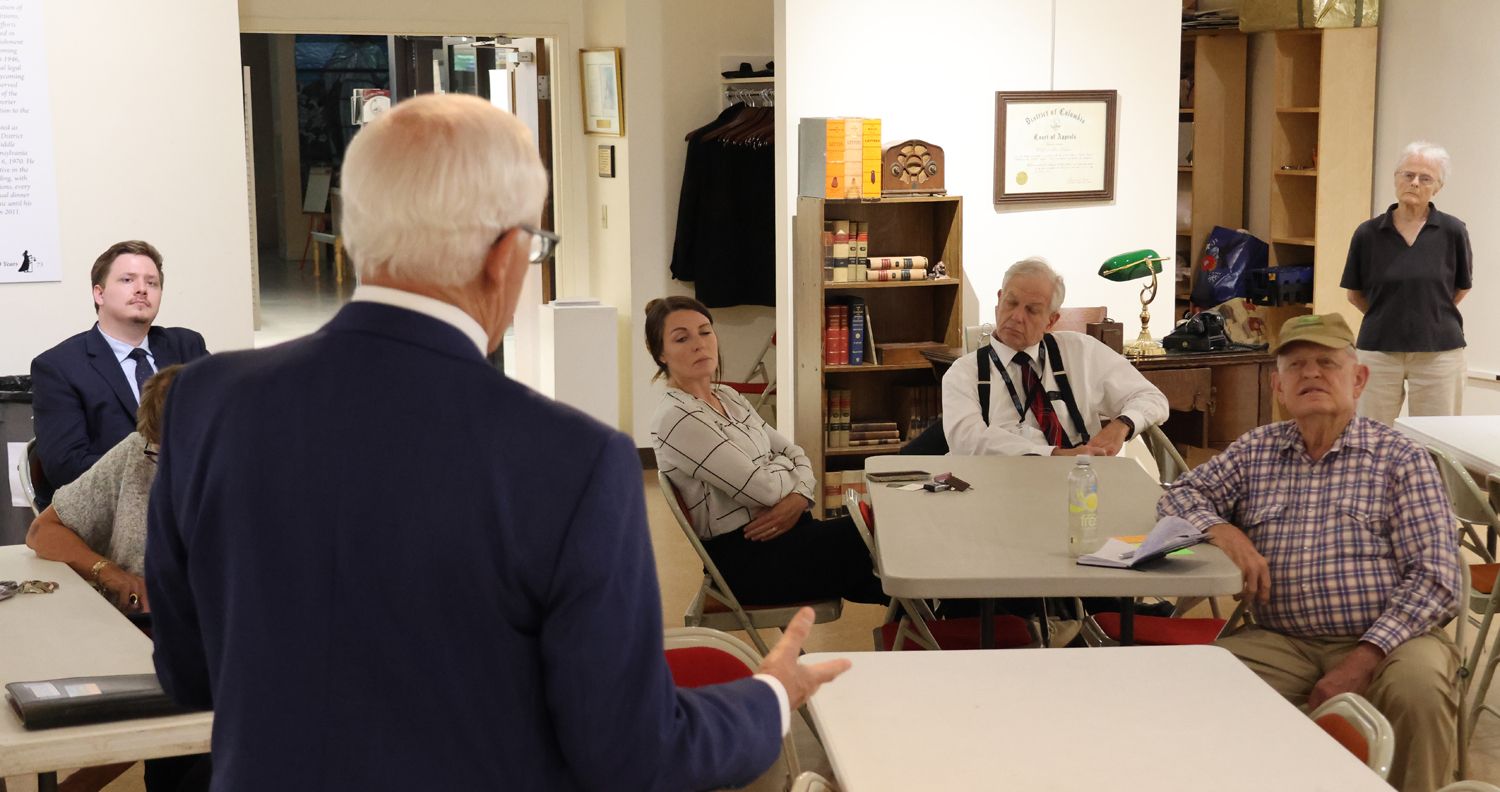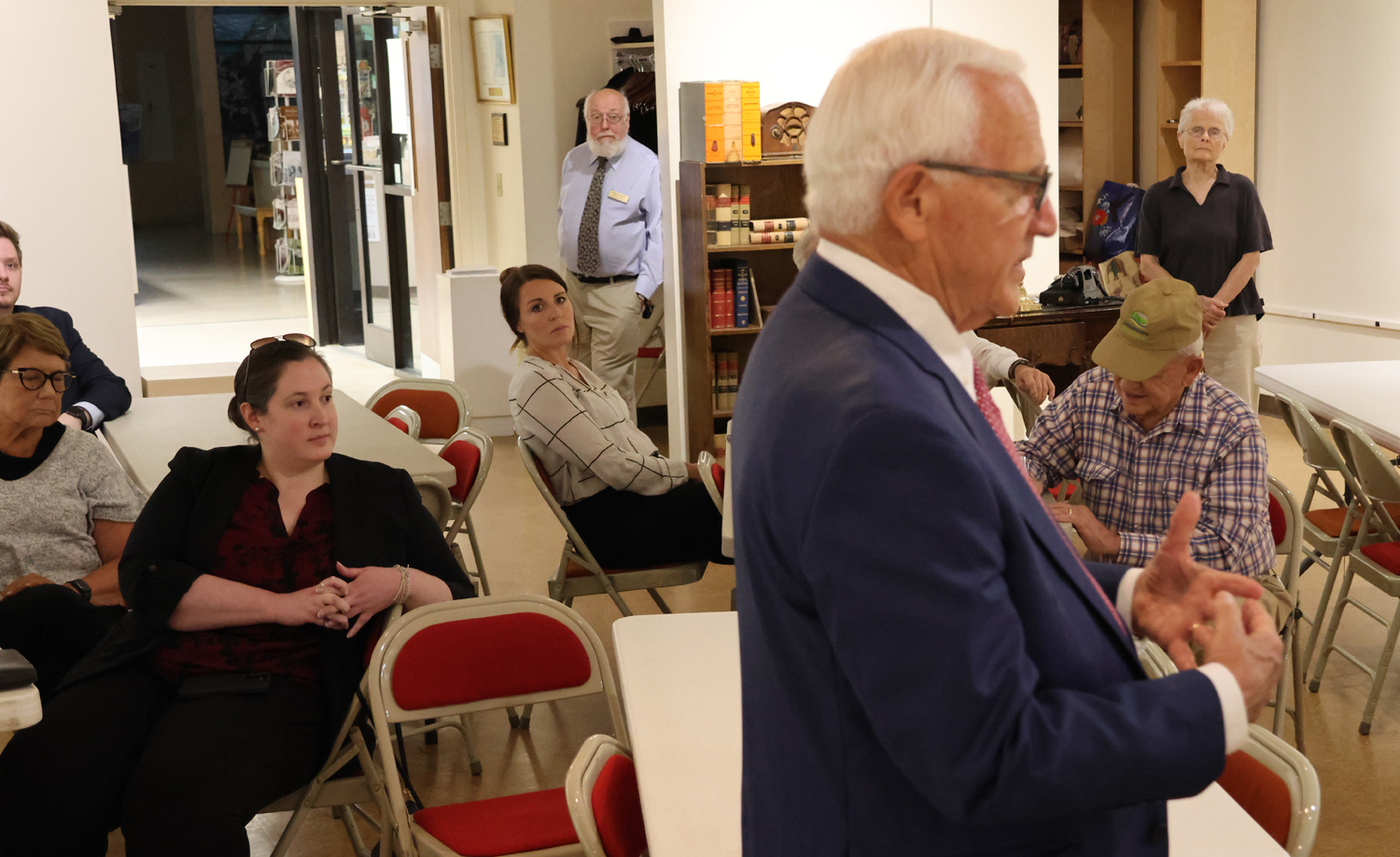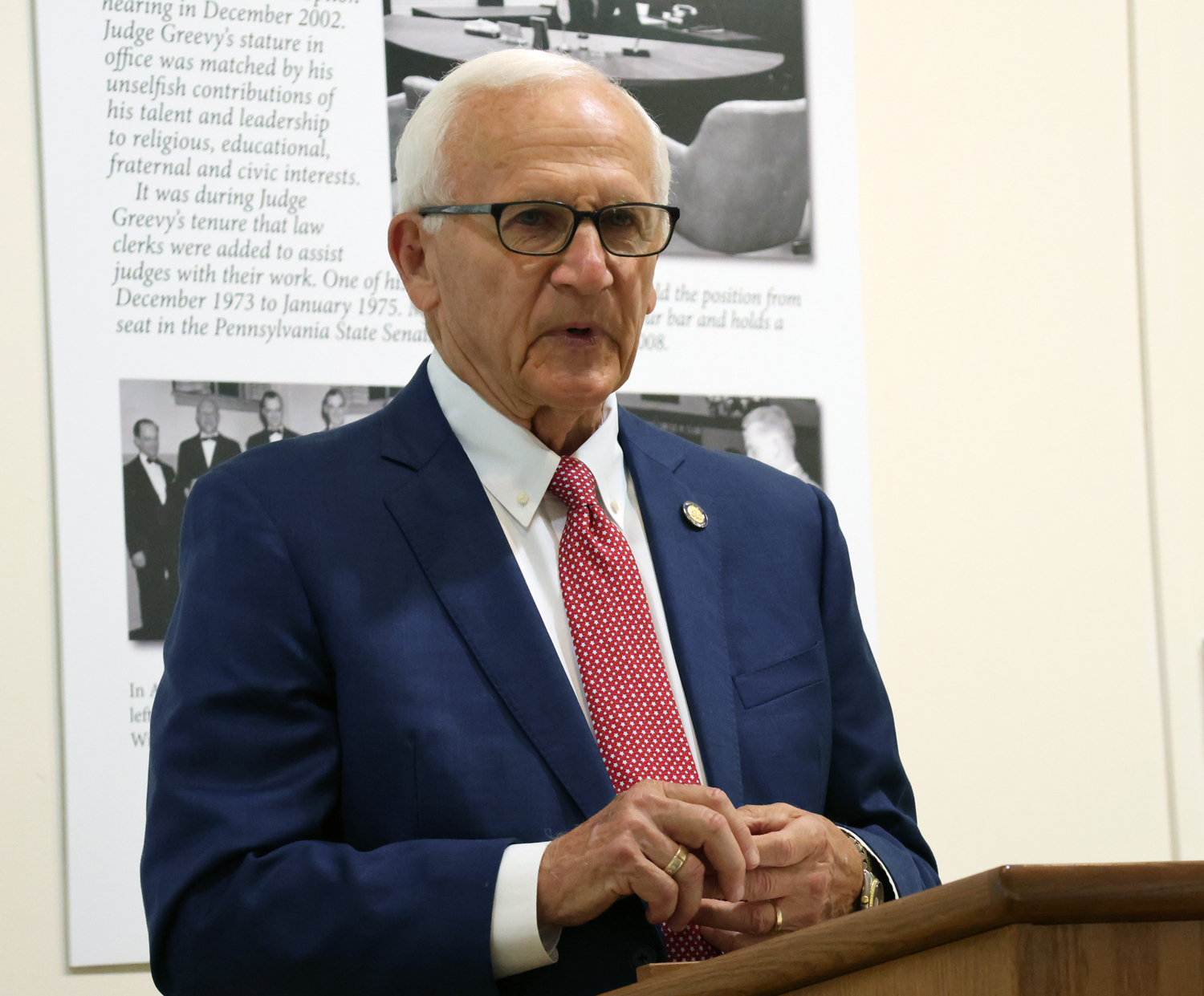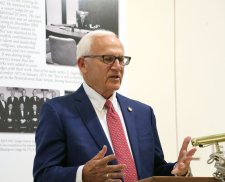Senator Yaw Reviews His Role in Harrisburg in Taber Museum Lecture
 The fourth lecture in the series, co-sponsored by the Lycoming Law Association and the Taber Museum, took place on July 9, 2025. Pennsylvania State Senator Gene Yaw spoke of his responsibilities in the Pennsylvania State Senate and the role of the Senate in enacting legislation and setting public policy.
The fourth lecture in the series, co-sponsored by the Lycoming Law Association and the Taber Museum, took place on July 9, 2025. Pennsylvania State Senator Gene Yaw spoke of his responsibilities in the Pennsylvania State Senate and the role of the Senate in enacting legislation and setting public policy.
Senator Yaw recently entered into his fifth term as a state senator. He is one of the 50 members of that body.
He is also a member of the Lycoming Law Association and is one of only two lawyers to have served the 23rd Senatorial District. The other was Henry Hager, who served from 1973 through 1984. Hager was the majority leader and then the president pro tempore of the Senate. He subsequently left to become president of the Pennsylvania Insurance Federation.
Yaw was specifically requested to discuss his role on the Senate Judiciary Committee. However, although he serves as vice-chairman of the committee, that is not the committee he enjoys the most. He prefers the committees that allow him to travel and to get outdoors, as opposed to the more studious requirements of the judiciary committee. He mentioned that he had to fight not to be appointed chairman of that committee.
The Senate has 24 committees, with no one committee any more important than the other. Each serves a particular role. The judiciary committee does serve an important purpose, as that is the first place where judicial appointees go to be vetted by the Senate. The judiciary committee also reviews the Crimes Code and addresses required changes in criminal statutes. A few years ago, he was informed of an error in Megan’s Law (relating to sex crimes against children) by a law clerk in the Lycoming County court system. He was able to shepherd through an amendment to correct the error.
One of the most important committees he serves on is the Agricultural and Rural Affairs Committee, because the issues that committee deals with affect many people in his district. One of the issues that the committee is addressing is mental health issues involving farmers.
He is also a member of the Banking and Insurance Committee and the Community, Economic and Recreational Developmental Committee. He mentioned that the Rules and Executive Nominations Committee works behind the scenes on proposed appointees, who will go to the Senate for approval for certain positions that are nominated by the Governor and approved by the Senate. He described the process for nomination as more a matter of collaboration between the executive and legislative branches to ensure a smooth process for appointments.
In understanding how the committee system works in the Pennsylvania General Assembly, the most significant aspect to know is that the chair of the committee is all powerful. The chair has the complete ability to control the agenda. One place where he has some significant influence as a chair is the appointment of individuals from his district to serve on boards and commissions, and that increases this area’s influence with policies under the jurisdiction of these bodies.
 He discussed the size of his district, which is very large. Because he covers a rural district, and each of the 50 senators have roughly the same number of constituents, the 23rd Senatorial District is roughly the size of the Chesapeake Bay, covering five counties. Because of demographic issues, he is concerned that the district will just get larger as the population is tending downward.
He discussed the size of his district, which is very large. Because he covers a rural district, and each of the 50 senators have roughly the same number of constituents, the 23rd Senatorial District is roughly the size of the Chesapeake Bay, covering five counties. Because of demographic issues, he is concerned that the district will just get larger as the population is tending downward.
Senator Yaw does serve as the chairman of the Environmental Resources and Energy Committee. In that committee, he is dealing with a number of very significant issues relating to Pennsylvania's energy needs. The number one issue that the committee is addressing is grid reliability – how do we keep the lights on?
Interestingly, Pennsylvania is the number one exporter of energy in the United States. He mentioned that so many states are, in the name of green energy, dismantling their fossil fuel power plants and relying on power generated in other places, particularly Pennsylvania. Unfortunately, states that are retiring power plants are doing so without any consideration of how their resident’s energy needs are to be served. They are assuming that somebody else will produce that power that they have decided not to produce.
He discussed the two types of energy – thermal and non-thermal. Thermal relies on the creation of steam, and it is always available. These are the systems that are being retired and not being replaced. Non-thermal systems such as wind and solar are intermittent and not reliable to meet the country’s energy needs.
He discussed some estimates as to the country’s needs for electric power within the next five years and the concern that the energy plants now in place or planned will not be sufficient to meet those needs. He mentioned that there is a particular concern with the implementation of AI – data centers are a huge user of energy.
Senator Yaw mentioned several issues with which he was involved as a senator. One of the more fun ones was the establishment of the Hellbender as the state amphibian. He recalls meeting with a group of junior high students who had done all of the leg work necessary for legislation to be introduced to establish the Hellbender as the state amphibian. Senator Yaw introduced the bill, which was defeated during that first session, but then subsequently passed. The governor signed the legislation. He recalls feeling satisfied about the level of involvement of the students who first proposed the designation to him as they watched the process work through passage and implementation to the point where they were now young adults when the governor signed the bill.
 He described his involvement with a bill to address a flaw in state legislation that allowed disbarred attorneys to continue to serve in the elected position of district attorney. Under the legislation that was passed, that is no longer possible.
He described his involvement with a bill to address a flaw in state legislation that allowed disbarred attorneys to continue to serve in the elected position of district attorney. Under the legislation that was passed, that is no longer possible.
A few years ago, he introduced a carbon capture bill that would have allowed Pennsylvania to participate in a federal program with significant local funding available. The bill languished and, as the end of the session was reached, was likely to disappear. However, as the session was coming to a close, he learned that the bill had received significant union support and within two hours the bill was passed by the House and sent to the Senate where it was also approved.
A few years ago, fireworks were available for sale in Pennsylvania but could be sold to Pennsylvanians only if it was novelty fireworks. Consumer fireworks could be sold in Pennsylvania but only to out of state purchasers. To Senator Yaw, this distinction made no sense, and he proposed legislation to address that, which did not pass. However, through the negotiations involving the budget resolution, the provision was inserted and did pass.
The Senator works with the Center for Rural Affairs, which addresses key issues that have a significant effect on residents of rural areas. A few years ago, there were hearings on the effect of the easy availability of opioids, which were quite impactful. Recently, they have undertaken a population survey. Each of the counties in his district are projected to get smaller. This is a big deal, and so they are studying how to get people to stay in the more rural areas of Pennsylvania.
He sits on the Chesapeake Bay Commission. He pointed out that much of the water in the Chesapeake Bay originates in Pennsylvania and that Pennsylvania was a significant polluter. Now, Pennsylvania is becoming a leader in addressing that pollution through working with farmers, who are the primary sources of that pollution.
The Senator did discuss a number of bills that have been passed by the Senate and are now languishing in the House. These include bills establishing an independent energy office, changing the name of the Department of Environmental Protection to the Department of Environment Services, a bill concerning the decommissioning of solar panels, an energy choice bill, stream maintenance programs and the like. He pointed out that the chairman of the House Committee is not particularly supportive of bills the Senate sends over. He did mention that bills sometimes get passed during budget season because there is a lot of trading that goes on between the House and the Senate.
Following his formal remarks, the Senator was asked questions about the implantation of small nuclear plants, the safety of CO2 pipes, if there is consideration of how to dispose of electrical car batteries and how to improve the provision of civics education to young people in Pennsylvania.
Senator Yaw’s remarks provided fascinating insight on the inner workings of the Pennsylvania Senate and in particular, how legislation is proposed and eventually passed or passed over by the General Assembly.

